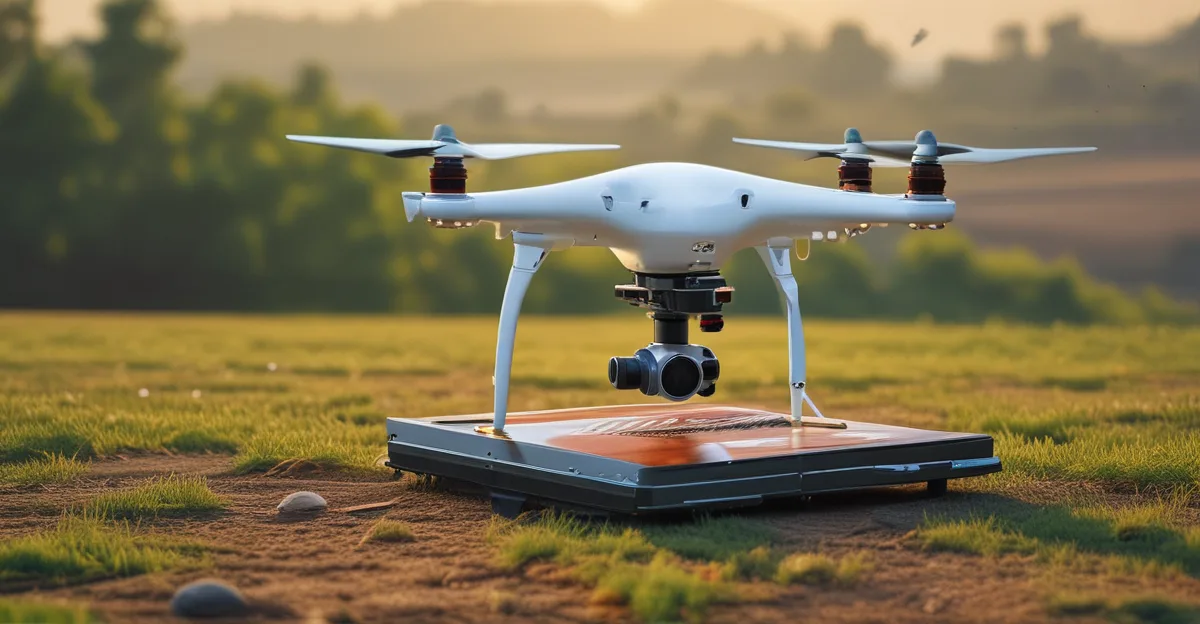Auto-published by Growwh – a smarter way to scale content and marketing. Want to know more? Chat with us.
The integration of advanced EV batteries in drones is revolutionizing logistics, surveillance, and agriculture in India by improving performance, durability, and efficiency.
Auto-published by Growwh – a smarter way to scale content and marketing. Want to know more? Chat with us.
EV Batteries for Drones: Unlocking New Possibilities in Indian Logistics and Agriculture
Across India, drones have moved beyond experimental trials and promotional uses to become critical tools in various practical applications. Whether delivering medical supplies in remote Northeastern states, surveying border areas in Rajasthan, or spraying fertilisers over paddy fields in Andhra Pradesh, drones are revolutionizing operations nationwide. Central to this growing drone ecosystem is the advancement of EV batteries, which are overcoming the challenges posed by India’s diverse terrain, extreme climate, and infrastructural gaps.
Ready to take your brand to the next level?
At Growwh, we help startups and emerging brands grow faster with powerful content, creator collaborations, and tech solutions.
Explore what we do →
The Need for Superior Batteries in Diverse Indian Terrains
India’s geography presents unique challenges—from the icy heights of the Himalayas and the scorching Thar Desert heat to the humid coastal areas of Odisha and West Bengal. These environmental extremes severely stress drone operations, especially their batteries, which must remain lightweight yet efficient.
Currently, most commercial drones use lithium-polymer (LiPo) batteries that initially perform well but degrade rapidly in hot or humid conditions. For example, in Telangana or Gujarat, where summer temperatures exceed 45°C, battery life significantly shortens, leading to frequent replacements and higher costs. This scenario is especially tough for agri-drone startups and logistics providers operating on tight budgets.
Emerging EV-grade lithium-ion and lithium-sulfur batteries are designed to meet these demands. Offering higher energy density and resilience, these battery technologies are tailored for challenging Indian conditions, providing longer flight times and better durability.
Enhancing Remote Logistics with EV Battery Innovations
India’s remote regions, such as Arunachal Pradesh, Ladakh, Meghalaya, and parts of Chhattisgarh, suffer from poor road connectivity. Drones equipped with improved EV batteries have become vital in overcoming these logistical barriers. Medical drones transporting vaccines, blood samples, and essential medicines depend heavily on battery capacity to cover long distances and maintain operational readiness.
Lithium-ion battery modules initially developed for electric scooters are now being adapted for drone use, enabling delivery runs of 15–20 km per charge. This range effectively connects local health centers with remote tribal villages and delivers urgent supplies during natural disasters like floods or landslides.
Fast-charging features, originally created for electric vehicles, are also revolutionizing drone operations. In many rural and semi-urban locations, where power infrastructure is scarce, the ability to recharge drone batteries in 30 minutes (versus traditional two-hour charging) dramatically improves mission turnaround times.
Improved Surveillance Capabilities in Challenging Terrains
Effective surveillance is critical for monitoring India’s forests and border regions. In Jharkhand forests or Kerala’s coastline, drones offer frequent, focused patrols. However, older batteries restricted flight times to under 30 minutes, limiting coverage area and operational efficiency.
New EV batteries incorporating smart thermal management extend flight duration to 45–60 minutes, enabling drones equipped with infrared or night-vision cameras to operate longer and safer patrols. This reduces take-off frequency and enables comprehensive monitoring, especially important for nighttime surveillance.
Urban centers such as Bengaluru, Hyderabad, and Lucknow are increasingly using drones for traffic monitoring, overseeing construction compliance, and managing public events. Robust battery life supports continuous drone loops over these cities without the hassle of frequent battery swaps.
Meeting India’s Agricultural Needs with Advanced Drone Batteries
Drones are making significant inroads in Indian agriculture, with farmers in Punjab, Tamil Nadu, and Maharashtra using them to spray fertilisers, pesticides, and micronutrients over vast fields. However, carrying loads of 10–20 litres adds considerable weight, demanding more efficient battery solutions.
EV battery technology adapted from electric rickshaws and two-wheelers offers longer flight times, better heat resistance, and durability through over 200 charge cycles, making them ideal for challenging agricultural environments.
The growth of drone-as-a-service (DaaS) models further emphasizes battery innovation. Instead of costly battery purchases, many farmers and service providers prefer swappable EV battery packs that can be charged off-grid using solar setups or mobile charging vans, enhancing operational flexibility and cost-effectiveness.
The Future of Drone Batteries in India
- Local Battery Production: Supported by India’s Production-Linked Incentive (PLI) schemes, localized manufacturing of batteries is increasing. This development is expected to lower costs and improve accessibility of drone batteries, especially in rural areas.
- Battery Swapping Hubs: States like Andhra Pradesh are planning dedicated drone battery swapping stations for agricultural service providers. These hubs will enable quicker turnaround times and scalability in drone operations.
- Smart Battery Management Systems: Customized battery management solutions are being developed that address India-specific challenges like heat, humidity, and voltage fluctuations, ensuring safer and more reliable drone flights.
By overcoming geographic and infrastructural challenges with advanced EV battery innovations, drones are poised to become indispensable tools for bridging crucial service gaps across healthcare, agriculture, and governance throughout India. From Himachal Pradesh’s mountainous terrains to Odisha’s flood-prone areas, improved batteries empower drones to fly farther, stay airborne longer, and carry heavier loads with enhanced safety and efficiency.
In summary, the synergy between cutting-edge EV battery technology and drone applications offers a transformative leap for logistical, surveillance, and agricultural solutions in India’s complex and diverse landscape.
About the Author
Pratik Kamdar is the Co-Founder of Neuron Energy, a clean energy startup driving innovation in electric vehicle batteries, chargers, and sustainable mobility solutions.
Source
This article was auto-generated as part of a smart content campaign. Curious how we do it? Chat with us to learn more about our content automation systems.
This article was auto-generated as part of a smart content campaign. Curious how we do it? Chat with us to learn more about our content automation systems.
Discover more from Growwh
Subscribe to get the latest posts sent to your email.


